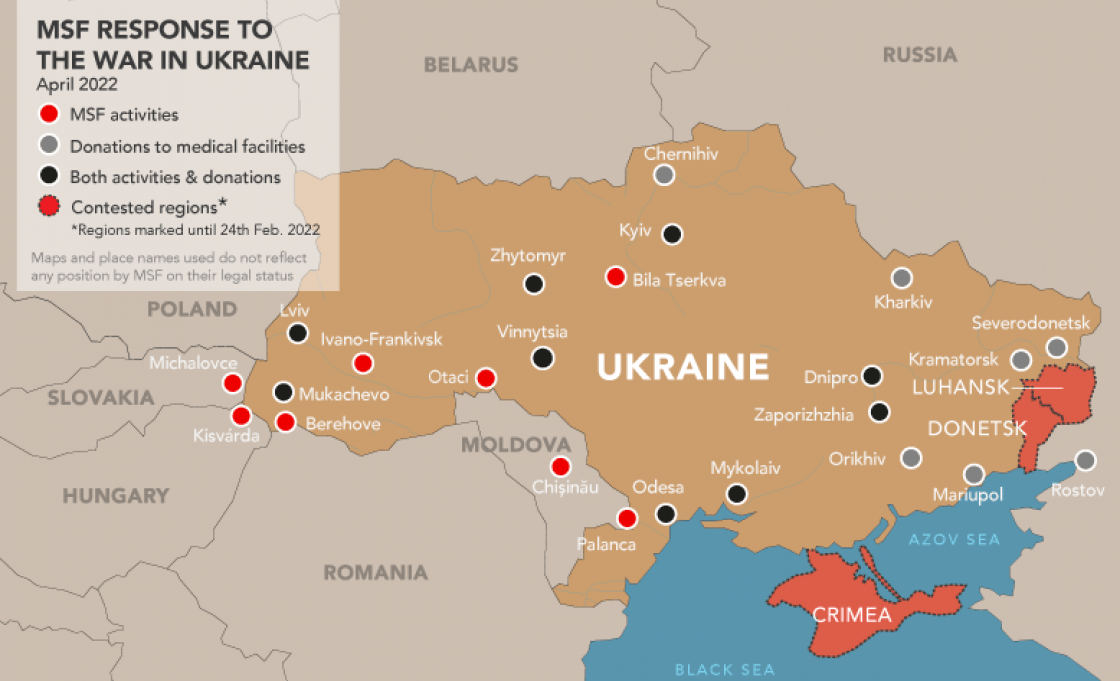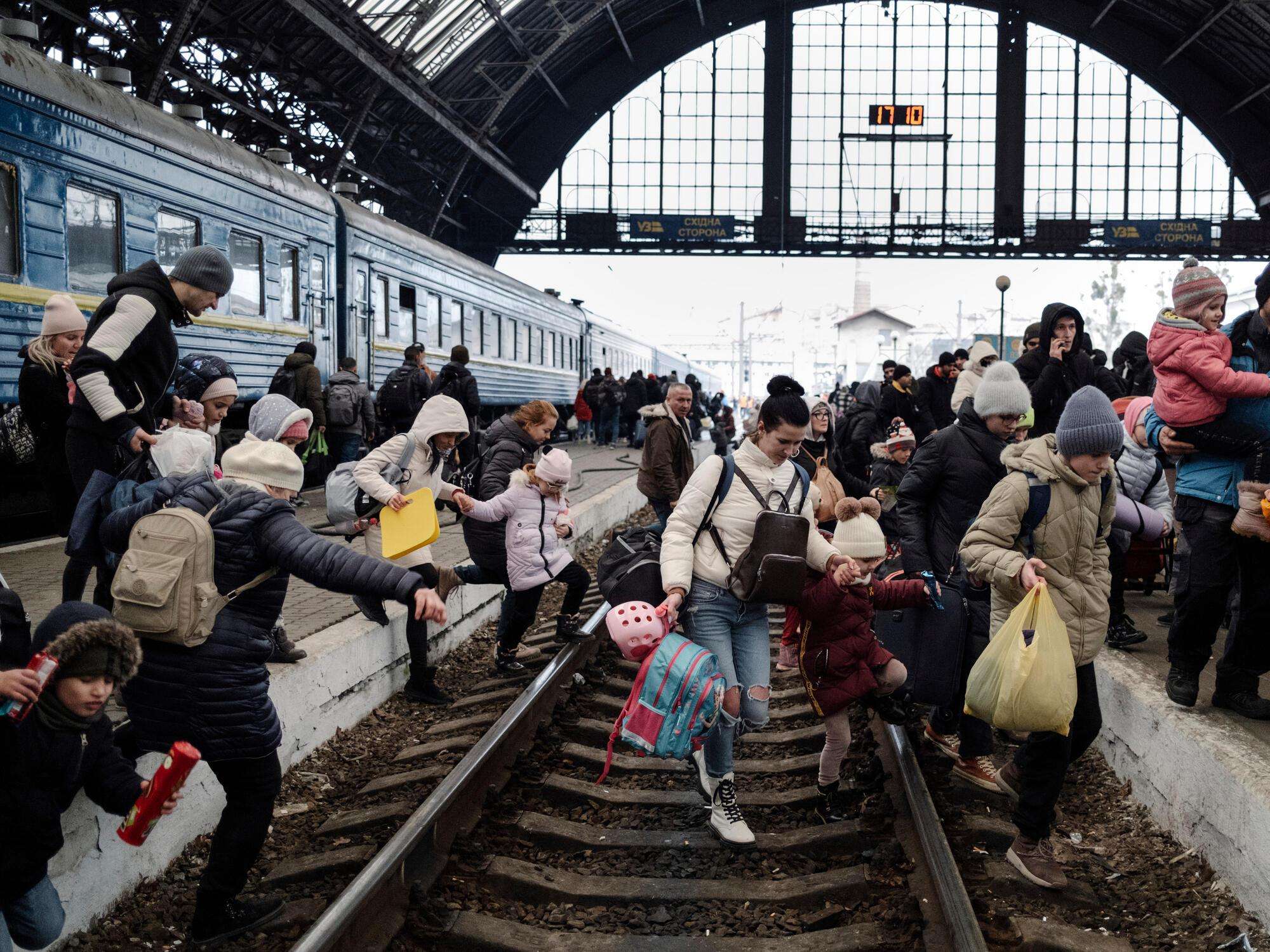This article was originally published on March 4, 2022, and is being regularly updated.
On February 24, Russia launched a large-scale military operation in Ukraine that rapidly escalated into a war across most of the country. Doctors Without Borders/Médecins Sans Frontières (MSF) is stepping up its medical humanitarian response to the deepening humanitarian crisis in Ukraine and in neighboring countries, where more than 8 million refugees have fled.
MSF has a longstanding presence in Ukraine, including in parts of the eastern region that have been affected by armed conflict since 2014. A large part of our work in Ukraine from 2014 to 2021 was responding to the needs of patients with HIV, tuberculosis, or other chronic illnesses. Due to the current war, we have halted normal activities and have started emergency activities in Ukraine. We currently have teams in Kyiv, Lviv, Vinnytsia, Zhytomir, Dnipro, Kharkiv, Odessa, Mykolaiv, Poltava, Bila Tserkva, Uzhhorod and Ivano-Frankivsk. We also have teams in Poland, Moldova, Hungary, Slovakia, Russia, and Belarus. MSF is an independent and impartial organization committed to providing medical humanitarian assistance to people affected by the war no matter who they are or where they are.
MSF staff in Ukraine are delivering urgent medical supplies, training health workers on managing mass casualty incidents, running mobile clinics, and organizing medical evacuations of hospitalized patients from the east to the west of the country.
Medical evacuations by train
Working with Ukrainian Railways, we outfitted a two-car medical train to refer hospitalized patients from the war-torn east of the country to Ukrainian medical facilities in the west. On April 1, nine people—including children—in serious but stable condition were transferred from a hospital in Zaporizhzhia, in southeastern Ukraine, to major referral hospitals in Lviv. Further medical referrals are now underway by train, bringing patients from Kramatorsk and other areas. On April 8, MSF responded to reports of the bombing of a train station in Kramatorsk, which imperils future train evacuation efforts.
Mobile clinics
Our teams are providing basic health care to people affected by the war. In Kharkiv, northeastern Ukraine, our mobile clinic team has carried out more than 800 medical consultations in subway stations where residents are taking shelter from Russian bombing. Another team has started providing care to displaced people along the border with Hungary, in southwestern Ukraine. The needs include mental health care and continuity of care for patients who were on treatment for medical conditions before they were displaced.
Medical and humanitarian supplies
On March 6, MSF's first shipment of emergency medical supplies was delivered to the Ukrainian Ministry of Health in Kyiv, and subsequent shipments have arrived since then. We supply surgical kits, trauma kits, and other basic necessities, including for hospitals in areas farther east where they are especially needed. So far the most needed supplies are surgical, trauma, emergency room (ER), and intensive care unit (ICU) equipment and drugs. But other key medical items are also urgently needed as the conflict continues, including insulin for diabetes patients and medicines for patients with chronic diseases such as asthma, tuberculosis, hypertension, or HIV. Transportation of some of these essential supplies will require the added complexity of a cold chain. We are exploring more ways to safely move medical supplies within the country.
Displaced people are now sheltering in Lviv and other towns in western Ukraine. Many have have left their homes with only what they could carry. Local volunteers and civil society organizations are working hard to help them, but conditions are harsh, with available accommodations already past capacity. We have donated a large supply of cold weather items including sleeping bags, warm clothes, and tents to civil society organizations supporting displaced people.
Central and Northern Ukraine
An MSF team has started providing basic health care, including mental health care, to people in the town of Hostomel, near Bucha and Kyiv, after it was occupied by Russian forces for 35 days.
Another team began providing psychosocial and medical care to people around the community of Makariv, outside of Kyiv, on April 5. So far we have provided about 60 medical consultations, primarily for older people and displaced people with chronic health conditions.
On March 13 and 14, an MSF surgical team visited the 750-bed Okhmatdyt pediatric hospital in central Kyiv to begin providing training and advice related to trauma surgery and the management of mass casualty events. In Bilal Tsverka, about 50 miles south of Kyiv, an MSF team is leading a two-day training on managing mass casualties and donating supplies to health facilities in the region.
In Chernihiv, northern Ukraine, we provided medical supplies to a regional hospital and a maternity hospital. In Kharkiv, northeastern Ukraine, we are planning to provide mass casualty trainings for hospital workers.

Southern and Western Ukraine
We have assessed the needs in health facilities in Uzhhorod and Ivano-Frankivsk and are establishing a network to provide medical donations, including in frontline areas. We are carrying out trainings for health professionals in Ivano-Frankivsk and have carried out a mass casualty training at the main referral hospital in Mukachevo.
In the southern cities of Odesa and Mykolaiv, we have donated medical supplies to hospitals preparing to accept wounded and conducted mass casualty trainings for several hundred health workers. On April 4, a four-person MSF team visited Mykolaiv to meet with city and regional health authorities. As they entered the city's oncology hospital, which has been treating wounded people since the beginning of the war, the area around the hospital came under fire at about 3:30 p.m. local time.
In Lviv, teams have donated medical supplies to health facilities and are providing mass casualty training to hospital staff. In and around Zhytomyr we have donated trauma-related supplies and conducted mass casualty training in nine hospitals. We have also been able to move a considerable part of our tuberculosis (TB) supplies from Kyiv to Zhytomyr, where we were previously running a TB program.
In Vinnytsia Oblast, we are working with local hospitals to help them prepare for mass casualties, exploring how we can provide water and sanitation support, and making donations of medical supplies. In Nemyriv district, we have started supporting psychological care for people with mental health conditions and are planning to support physiotherapy for war-wounded patients.
Dnipro and Eastern Ukraine
Just before the war began in late February, MSF surgeons with experience in war zones provided training remotely to surgeons in key hospitals in eastern Ukraine that have since received many wounded people.
In Dnipro, an MSF team has conducted mass casualty trainings in hospitals and donated medical supplies to the regional hospital, helping prepare for future needs. In Kramatorsk, we have donated supplies to seven hospitals with the highest needs. In Orikhiv, we have donated first aid and surgical kits, and have provided mass casualty training for medical staff.
The humanitarian crisis in Mariupol is growing more and more desperate. The city in southeastern Ukraine remains surrounded by Russian military forces and subject to repeated artillery and aerial bombardment. Residents shelter in basements. Shops are closed. Food and clean water are difficult to find. Pharmacies have run out of medicines. People are lying dead in the streets. Gas and electricity have been off for days, in sub-zero temperatures. People are making fires to cook food and keep warm. Many ceasefire attempts have failed, trapping people inside the city and preventing humanitarian aid from entering. Civilian and medical infrastructure has been damaged, and communication is extremely limited. An MSF staff member from Mariupol shared his personal story of surviving under intense bombardment and being forced to flee.
MSF is calling for safe passage for those willing and able to escape across war-affected areas inside Ukraine, regardless of the existence of humanitarian corridors or temporary ceasefires. People who stay behind must not lose their civilian status: Warring parties must do everything in their power to prevent harm to civilians at all times, in all places.
In Zaporizhzhia MSF has started providing psychological first aid to people who have recently arrived from Mariupol and surrounding areas at reception centers and shelters. We have also donated medical supplies and carried out mass casualty training for staff at the main referral hospital in Zaporizhzhia. In Pokrovsk we donated medical supplies to the main hospital to support treatment of trauma and maternity patients.
Moldova
More than 399,000 people have crossed into Moldova from Ukraine since the war began. Moldova, which has a population of just 2.6 million people, now hosts the largest concentration of Ukrainian refugees per capita, according to the UN Refugee Agency (the source of refugee figures used on page).
At the Palanca border crossing, an MSF team is supporting Moldovan health staff on site and offering psychological first aid to refugees escaping the fighting in southern Ukraine. We also set up a health post near the border crossing in Otaci, offering similar services. Our teams in the capital, Chișinău, have provided psychological first aid to people in reception centers and are evaluating how to improve access to health care for refugees in hospitals.
Poland
More than 2.4 million people have fled Ukraine to Poland so far. MSF initially donated non-food items to the Red Cross Lublin and to a reception point in Horodlo, near the Zosin border crossing. Our staff in Poland have assessed needs at border crossings, transit centers, and train stations, and are also supporting our emergency response in Ukraine.
Hungary
Nearly 398,000 people having crossed as refugees into Hungary. While our initial assessments indicated that many of the immediate needs of refugees are being met, we have started working with the support of Hungarian doctors, in partnership with local organizations, to provide primary health care and psychological first aid.
Slovakia
More than 302,000 people have crossed into Slovakia from Ukraine as of April 5. An MSF emergency team arrived in the country at the beginning of March to assess the medical and humanitarian needs. We have signed a Memorandum of Understanding with the Ministry of Health in order to import medical supplies and enable our possible work in the future. For the moment, critical medical and humanitarian needs in Slovakia are being met by local authorities and civil society groups.
Russia
MSF works with the health authorities in Arkhangelsk and Vladimir regions to reduce the burden of drug-resistant tuberculosis (DR-TB) and improve treatment for the disease. More than 350,000 people have crossed to Russia from Ukraine as of April 5. MSF is currently exploring whether new medical humanitarian needs have emerged in border regions. Our team has visited Rostov and Voronezh and is heading to Belgorod. In Rostov, we donated food, hygiene kits, essential relief items and medicines to be distributed among displaced people.
Belarus
MSF continues to run its regular programs in Belarus, supporting the national tuberculosis program and hepatitis C treatment in prisons. Since 2021 we have also assisted people on the move stranded between Belarus and the European Union countries. MSF has carried out an initial assessment of the situation on the border with Ukraine and stands ready to assist with emerging medical and humanitarian needs. As of April 5, about 17,000 people have crossed into Belarus from Ukraine.

